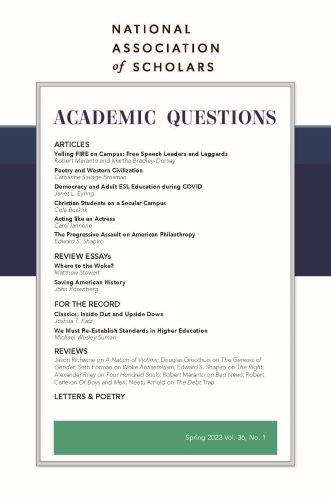Nation of Victims: Identity Politics, the Death of Merit, and the Path Back to Excellence, Vivek Ramaswamy, 2022, Center Street, pp. 228, $26.10 hardbound.
Jason Richwine is a resident scholar at the Center for Immigration Studies. He last appeared in AQ in spring 2021 with “The 1965 Immigration Act: A Little Humility, Please!”
Early in Vivek Ramaswamy’s new book, Nation of Victims, the reader encounters a bracing metaphor: “American grievance has become like a black hole dragging the rest of the world into its maw, warping time and space to capture everything that offends it.”
The imagery is extreme, but one quickly understands how aptly a black hole illustrates the modern process of “cancellation.” The Confederate general James Longstreet, a man Ramaswamy admires for his efforts at postwar reconciliation, “is stuck deep in that singularity, so far gone that no light from him can escape.” Now even the great philosopher David Hume, currently under fire for racial views that were common in his own time, is “beginning in the same journey, slowly being dragged to the event horizon, the point where the gravitational pull of American victimhood is too strong for even his great ideas to break free.”
For Ramaswamy, the black hole of grievance is a natural consequence of what he calls America’s victimhood culture. His thesis is that Americans once considered themselves underdogs—people who are motivated to work harder and longer to overcome their alleged disadvantages, repeatedly proving their value through rugged labor. Today, Americans act like victims. They still see themselves as disadvantaged, but they no longer strive to prove their detractors wrong. They instead demand compensation from the rest of society.
The author finds ample evidence of the victimhood mindset. Victimhood is in fact the premise of critical race theory, which posits that non-white Americans (especially blacks) are held back by social and economic structures that exploit them. The same mindset undergirds complaints of “microaggressions” and “cultural appropriation.” It motivates various academics to fake non-white ancestries, and it even convinced actor Jussie Smollett that staging a hate crime against himself would be good for his career.
There are numerous casualties when Americans stake their claims as victims. For example, all victims need to provide ongoing evidence of their oppression, and so historical figures who had problematic viewpoints need to be canceled—captured by the figurative black hole—before their names and images can do any further harm. Even simple words and numbers must be shunned if they remind some group of its oppression. Ramaswamy offers the example of the Women’s March organizers who felt moved to “apologize deeply” after earlier noting that their average donation amount was $14.92—a number that resembles “a year of colonization, conquest, and genocide.”
Victims also demand robust preferences in college admissions and hiring, leading to a de-emphasis on achievement. Many universities no longer require standardized tests for admission because they are uncomfortable with group differences in average scores. Ramaswamy rightfully wonders how the U.S. will win the technological race with China when Americans have such comparatively little interest in merit. “When a nation peaks . . . its focus shifts from producing wealth to arguing over how to distribute it,” he writes.
Ramaswamy also answers a smart objection: shouldn’t the victimhood mindset burn itself out once everyone becomes a victim? No, the author replies, because there is a hierarchy of victimhood. Even when all groups claim oppression, they will still compete to determine which group’s grievances deserve the most recompense. The result will be endless bickering and inevitable national decline. The only solution here, as Ramaswamy sees it, is a full-scale rejection of victimhood culture and a re-embrace of the underdog mentality that helped build America.
In diagnosing a serious problem and offering a better path forward, Nation of Victims clearly succeeds. More debatable is how much new it offers to close followers of American politics. In reading the book, I personally found myself nodding along, usually agreeing with Ramaswamy’s points, but also finding its themes familiar.
Fortunately, the book does hold even the knowledgeable reader’s attention. It covers an eclectic mix of topics—history, economics, law, philosophy, and religion—and there are some fresh insights along the way. Especially interesting is Ramaswamy locating victimhood culture in the Supreme Court’s elevation of “equal protection” as a fount of rights for designated victim groups. Modern equal protection doctrine subjects group-based classifications to tiers of judicial scrutiny. In what Ramaswamy calls “the Constitutional Oppression Olympics,” groups accentuate their victimhood in hopes of winning the highest level of protection for themselves. Had the Court instead focused on the “privileges and immunities” of individual citizens, Ramaswamy says, there would have been less legal incentive to claim victimhood.
The book occasionally has less agreeable moments. For one thing, readers who are bothered by the trendy use of they as a singular pronoun must endure sentences such as, “The underdog makes a demand of themself.” More substantively, Ramaswamy overstates the victimhood culture found on the political right. When Donald Trump reflexively attributes any setback to someone else’s failure, or to a system “rigged” against him, it is indeed an example of a victimhood mindset. However, the recent release of Twitter files revealing coordinated anti-Trump censorship leading up to the 2020 election provides at least some empirical grounding for the former President’s belief. More importantly, the former president’s personal attitudes are simply not comparable to the ideology of systematic oppression that underlies identity politics.
Ramaswamy is also too quick to dismiss concerns about immigration as an example of misdirected anger. He is correct that immigrants are generally not to blame for the decline of the Rust Belt, but when he implores former industrial workers to re-train and move to more dynamic areas of the country, he misses the role of immigration in discouraging that internal migration. As recent economic research shows, immigrants tend to move directly to the parts of the U.S. with the most labor demand, tamping down the wages that might otherwise have incentivized natives to relocate. (In fact, the same phenomenon happened in reverse after immigration restriction in the 1920s—northern industrial jobs that would have gone to immigrants were instead filled by Americans moving from agricultural areas.) Therefore, lowering immigration today could be the kind of impetus that Ramaswamy desires for victim-minded Americans to start seizing the initiative.
On the fraught topics of race and gender, the ultimate challenge for opponents of victimhood culture remains how to convince Americans to live with differences. If the standard for victimhood is the mere existence of disparate outcomes, as the activist Ibram Kendi contends, then there is no end in sight for American victimhood. By contrast, if institutions focus on maximizing individual excellence, with less regard for whatever group-based outcomes may emerge, then a sense of victimhood would decline.
A return to individualism is easier said than done, however, precisely because the persistence of group differences will always be ammunition for activists who argue that society is fundamentally unfair. Because Ramaswamy never quite acknowledges that group differences are a long-run phenomenon, he remains more optimistic than I am about a return to individualism, even as we are in full agreement about the pernicious effects of victimhood.
Photo by Isaac Garcia on Unsplash













